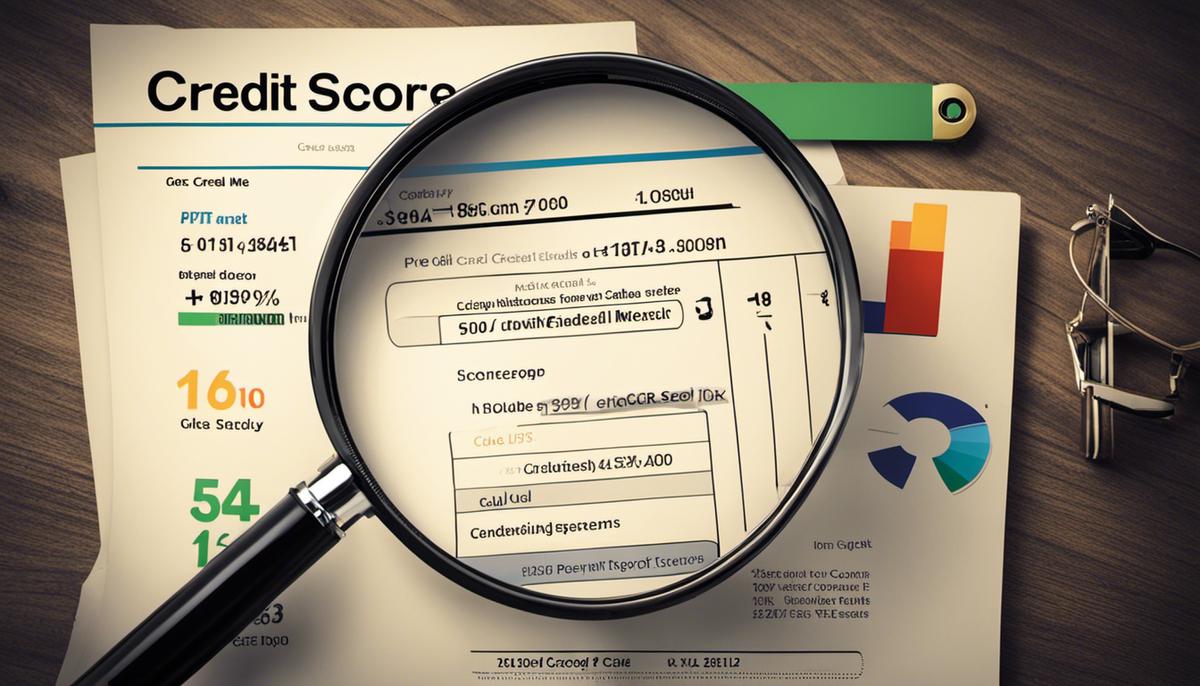For many individuals navigating the world of personal finance, understanding how credit scores work can be a daunting task. Yet, this score, a three-digit number, plays a pivotal role in shaping one’s financial life. It dictates the terms of borrowing, and can influence your ability to secure a mortgage, auto loan, or even impact your job prospects. In essence, your credit score is a representation of your creditworthiness – in other words, it signifies how likely you are to repay debts in a timely and responsible manner. This article will provide a comprehensive understanding of the concept of credit score, the various factors that influence it, and the steps you can take toward building or improving your financial health.
Table of Contents
The Concept of Credit Score
Unmasking the Enigma: The Credit Score Demystified
Unravel the threads of any business discussion, sift through the clamour of financial lingo, and you’ll invariably land at this nugget of wisdom: “Always mind your credit score!”. It’s almost second nature to the veterans of the business world, and a mantra for the young and aspiring. But, what exactly is a credit score? Let’s strip it back to the bare essentials.
Simply put, a credit score is a statistical analysis of a person’s credit files, representing their creditworthiness. With a remarkably consequential three-digit number, it tugs the strings of your fiscal destiny, swaying financiers and lenders in their decisions about your access to, and the cost of, credit.
Impressively robust in its predictive ability, a credit score is derived from a credit history report. Think of it as a financial report card that monitors your use of credit over time. Key contributors to its composition include payment history, debt ratio, length of credit history, diversity of the credit types, and the number and frequency of new credit applications.
Going beyond just a ‘debt meter’, your credit score can spur ripple effects across diverse verticals of your life. It influences loan approval processes, insurance premiums, rental agreements and, sometimes, even job opportunities. A high credit score can spell a sea of enticing benefits including lower interest rates, better chances for credit card and loan approval, and more favorable repayment terms. Conversely, a low score can slam shut certain doors, leaving you saddled with high interest costs and limited credit options.
Despite its vital implications, the sophistication of a credit score calculation remains a blind spot for many-a-business savant. It’s computed by credit-reporting agencies using financial formulas that weigh individual credit behavior patterns to predict future credit risk. In the U.S., the most widely used model has been the FICO score, which ranges from 300 to 850.
Creating a harmonious relationship with your credit score necessitates vigilant monitoring and preventative maintenance. Regular credit report checks, prompt bill payments, limiting new credit applications, and responsible borrowing practices can foster a healthy credit score. It’s not a magic spell, but steadfast diligence – a marathon of focusing on small, consistent finance practices.
Delving more intimately into the cogs of the credit score machinery or crafting a fine-tuned personal strategy could warrant a full-length book. However, understanding the core fundamentals spurs the first potent steps in your credit score stewardship journey. The seemingly daunting numeric code carries arguably one of the heaviest weights in the business realm but remember, with knowledge comes power. And in the world of credit, that adage holds perennially true. Crunch those numbers, strategize wisely, and your credit score could well be the wind beneath your financial wings. Buckle up, brave the financial roller-coaster with grit and grace, and steer your credit score to scale those dizzying heights of success. Because, in the end, it’s not just about credit; it’s about credibility.

Factors Influencing Credit Score
Experiencing a prism view of the finance world, one encounters the immutable truth that your credit score is far more than a mere figure; it is a barometer of your fiscal responsibility and a key determinant of your financial prospects. Now that you’re enlightened about what a credit score is, how it’s calculated, and its impact on various life aspects, you must also understand the factors influencing this crucial number.
Uncover the mystery behind credit score determinants and their impacts:
The volume of credit you owe and credit utilization: The sheer number you owe on all your credit accounts combined, versus the total credit available to you, is incredibly decisive. Often referred to as credit utilization ratio, it’s wise to maintain this figure under 30%. Enhanced credit balances could be deemed as crossing the threshold of manageable debt; leading lenders to believe you could default on new credit.
The length of your credit history: The lengthier the track, the better; as it gives lenders more data to analyze your pattern of borrowing and repaying. Maturity in credit handling is a strong influencer. If you’re a newcomer to the credit world, it’s not the end-all; other elements will carry more weight in the short term. However, keeping those long-standing accounts open and in good standing can positively boost your score over time.
The diversity in your credit types: From credit card balances to mortgage loans, car loans to student loans; the mix of credit displays your skill at managing various types of credit. A varied portfolio indicates you can handle a wide array of debts responsibly.
Your recent hunt for credit: Often overlooked, yet every time you apply for credit, it induces a “hard inquiry” on your credit report. An amplified number of such inquiries can hike the perception of financial risk, prompting a dip in your scores. Be discerning about when and where you apply for credit.
Your payment history: History has a funny way of repeating itself, and lenders are attuned to this truth. They scrutinize how consistently you’ve repaid past credits. Late payments, foreclosures, and bankruptcies negatively influence your score, reflecting a precedent of flippant credit practices.
To sum up, navigating the landscape of credit scores can be intricate. Addressing these factors head-on can position you one step closer to a competitive credit score. Yet, remember, Rome was not built in a day. Improvements in your credit score take time, patience, and financial discipline. Remain attuned to your financial habits and ensure each fiscal decision is one that brings you closer to your credit goals.
Now, as the unspoken rule of accomplished entrepreneurs dictates – knowledge is power, action is success. Go ahead, amp up your credit score – the finance world is your oyster.

Improving Your Credit Score
Proactive Measures to Boost Your Credit Score
Mastering the art of controlling a credit score begins with your understanding of its components and how they impact financial transactions globally. Leverage this knowledge to take control of your financial narrative.
With the fundamental understanding already apparent, let’s venture into actionable tips to enhance or maintain a commendable credit score. The path to credit score enlightenment requires a blend of discipline and strategic financial practices. However, never underestimate the potency of applying targeted techniques to skyrocket your credit score.
- Minimize Debt Load to Enhance Credit Utilization Ratio: Your credit utilization ratio — the difference between your overall credit balance and your credit limit – accounts for 30% of your FICO score. Strive to maintain your balances low by limiting the use of your available credit. Endeavor to stay well below the 30% threshold, to optimize your credit score.
- Establish a Robust Credit History: One prevalent criterion used by lenders is the length of your credit history. Although you can’t magically extend your credit history, you can certainly take steps today that will profit your credit score in the coming years. Maintain your oldest credit accounts and avoid unnecessary closures, as long-term accounts amplify your credit score positively.
- Diversify Your Credit Portfolio: Diversifying your credit accounts refracts a well-rounded financial acumen to potential lenders. This concept, known as credit mix, counts for 10% of your FICO score. A healthy dose of revolving credit (such as credit cards) and installment loans (like auto or student loans) displays financial responsibility.
- Tread Wisely With New Credit: While diversification is valuable, restraint in pursuit of new credit is equally critical. Intense credit activity can instigate suspicions of financial instability. Therefore, keep your credit inquiries minimal and spaced out effectively over time.
- Stringent adherence to Payment Responsibilities: Your payment history profoundly influences your credit score. Therefore, systematic and prompt bill payments significantly boost your credit standing. Utilize financial management tools to ensure you never miss a payment.
- Nurture a Financially Disciplined Lifestyle: Lastly, securing a significantly enhanced credit score demands lifestyle adjustments towards financial discipline. Embrace smart decisions such as adapting a budget, setting up automatic payments, and engaging in systematic savings.
Remember, incrementally improving your credit score is a marathon, not a sprint. It requires perseverance, sound financial practices, and wise credit management strategies to cultivate a robust credit profile. Start today, for success beckons the financially tenacious.

Having armed yourself with the knowledge of what a credit score is, how it’s computed, and the factors that influence it, you’re now better equipped to navigate the financial world. Building or improving your credit score is an ongoing journey, but armed with this knowledge, you’re more capable of making informed decisions. Remember, consistent and responsible credit habits are your best ally in maintaining or improving a healthy credit score. Continue to pay your bills on time, keep your credit utilization low, and apply for new credit sparingly. In doing so, you enhance not only your creditworthiness but also create a secure foundation for your financial future.

Lian Jadepeak is a Chartered Financial Analyst (CFA) with a sharp acumen for investment strategies and financial markets. With a background in finance and years of experience in wealth management, Lian offers readers expert insights into smart investing, market trends, and portfolio management. Her clear, analytical approach helps demystify complex investment concepts for both seasoned and novice investors alike.

